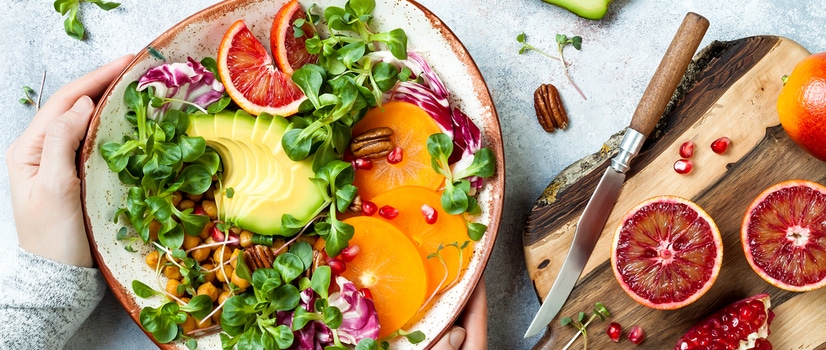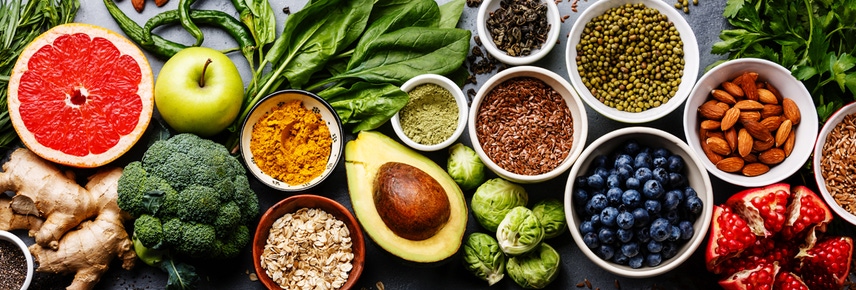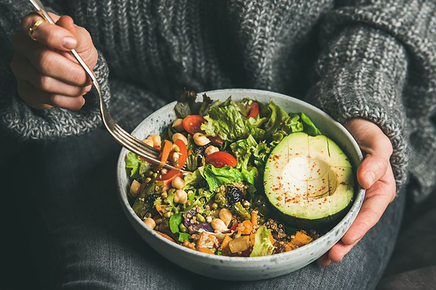
How to get the nutrients you need this winter
In winter the days are much shorter, it can be hard to get out of bed in the morning and kilojoule-heavy meals suddenly look very appealing. Worse, winter often means sniffles, sore throats, coughs and even the flu. But what you eat can help keep your immune system strong and ward off those pesky winter woes.
Sanitarium dietitian Charlotte Moor shares her top tips to get the nutrients you need each day. And, to make it even easier, we’ve got two great vegetarian meal plans that deliver a wellness punch.
Helping your immunity
Got a sniffle? You might be tempted to reach for the vitamin C tablets, but there is a better option. Charlotte says you can easily meet your vitamin C needs from foods that are readily available in winter such as potatoes, citrus, kiwifruit and broccoli, However, we don’t need as much vitamin C as you might think. And, importantly, immunity is about much more than vitamin C alone. For an immunity squad that’s really got your back, you’ll need foods rich in vitamins A, B, C, D and E, all of which help your body fight infections and keep you well in winter.
And it’s not just vitamins. Minerals such as iron and zinc, as well as the less well-known selenium, are also vital for your natural defences – they help with immune cell growth.
Eating for energy
In that dreaded winter hibernation mode? The colder months can, for many people, mean a slump in energy. But Charlotte says a number of everyday nutrients can help put a spring back in your step.
Iron is important. It’s essential for moving oxygen around the body so our cells can produce the energy we need to get through the day. Yet, worldwide, iron is the most common dietary deficiency – and almost a quarter of women don’t get enough.
Here’s a tip – iron is more easily absorbed when eaten with vitamin C-rich fruits and vegetables, so it’s really important to aim for at least 5 serves of vegetables and 2 serves of fruit a day.
Other important vitamins include B12, a nutrient that helps keep the body’s nerve and blood cells healthy and helps make DNA, the genetic material in all cells. Vitamin B12 also helps prevent a type of anaemia called megaloblastic anaemia that makes people tired and weak. Vitamin B3 unlocks energy from food. Vitamin B6 is needed for enzyme reactions, is involved in metabolism and helps make much-needed energy.
And if you’re making the most of that fabulous boost in energy, and now your muscles feel like they’re seizing up, magnesium rich foods may help keep you moving.
Nutrients for strong bodies
Healthy bodies come from healthy diets. But how do we know what we need?
Calcium is needed for strong bones and teeth, but that’s just the start. Charlotte says it’s a rockstar mineral that’s also essential for good muscle function and a healthy nervous system. Most women are low in calcium. The body cannot make its own calcium, so it’s important to ensure you’re getting enough in your diet. Similarly, potassium which also plays a role in nerve function, is not produced by the body and can be found in a variety of fruits (bananas, oranges, melon, dried fruits), veg (sweet potato, potato, broccoli, leafy greens, legumes), grain foods and milk.
Subscribe to Wholicious Living to stay up-to-date with the latest health and nutrition advice.
Other important nutrients
Winter getting you down? Folate might help. It not only plays a key role in the formation of healthy red blood cells, it also helps with normal mental function and a healthy nervous system. Fibre is another crucial daily nutrient. Along with supporting healthy digestion, fibre is important as it feeds our good gut bugs, which can help to support your mood and regulate your stress levels. Fibre also has powerful disease-fighting properties, which is why it is concerning that most Aussies aren’t eating enough fibre.
Finally, we need to make sure we’re getting enough protein each day. It builds muscle, is important for bone health and recovery from injury or surgery, keeps your appetite in check and is key for healthy growth – especially for kids and teens. Focus on including more plant proteins in your diet, which not only provide the above benefits, but also punches above its weight when it comes to heart and cholesterol health.
Plant foods to help boost your daily nutrient intakes
Nutrients | Examples of foods |
Protein | Legumes (e.g. lentils, kidney beans, chickpeas), tofu, tempeh, soy milk, wholegrains, nuts, seeds |
Fibre |
|
Calcium | Leafy greens, calcium-set tofu, legumes, nuts and fortified plant-based milks (choose plant-based milks with at least 100mg calcium/100mL) |
Iron | Tempeh, tofu, legumes, wholegrains, iron fortified breakfast cereals, green leafy vegetables |
Magnesium | Green vegetables, legumes, wholegrains, nuts |
Potassium | Leafy green vegetables, vine fruit such as tomatoes, cucumbers, courgette, eggplant and pumpkin, and root vegetables |
Selenium | Brazil nuts, legumes, wholegrains |
Zinc |
|
Vitamin A |
|
Vitamin B1 | Wholegrains, legumes, nuts, fortified breakfast cereals |
Vitamin B2 | Wholegrains, leafy green veggies, mushrooms, fortified breakfast cereals |
Vitamin B3 | Wholegrains, mushrooms, peanuts, fortified breakfast cereals |
Vitamin B5 | Legumes, potatoes, tomatoes, wholegrains |
Vitamin B6 | Wholegrains, legumes, green leafy veggies, nuts, fruit |
Folate | Wholegrains, green leafy vegetables, fruit, fortified foods e.g., bread |
Vitamin B12 | Foods fortified with B12 like plant-based milks, plant-based meat alternatives and Marmite™ |
Vitamin C | Potato, sweet potato/kūmara, citrus fruit, kiwifruit and broccoli, kale, tomatoes |
Vitamin D | UV-irradiated mushrooms, some fortified plant-based milks |
Vitamin E | Vegetable oil, nuts, seeds, wholegrains |
Plant-based meal plans to help you load up on nutrients
Eating a wide variety of plant foods is key to getting all that goodness into your day. Here are two plant rich meal plans that deliver key vitamins and nutrients you need.* Developed by dietitians and based on what they eat in a day.
Meal | Meal plan 1: Ingredients | Meal plan 2: Ingredients |
|---|---|---|
Breakfast | ||
Morning snack | Marmite on wholegrain crackers with cheese and dried apricots | Yoghurt with banana and cashew nuts |
Lunch | ||
Afternoon snack | Orange, brazil nuts and dried apricots | |
Dinner |
*Based on nutrient requirements of an average 35 year old woman who is moderately active. Note, nutrient requirements can vary between individuals - please consult a Registered Dietitian for individual advice

The latest nutrition advice, plus health and wellness tips delivered to your inbox monthly

